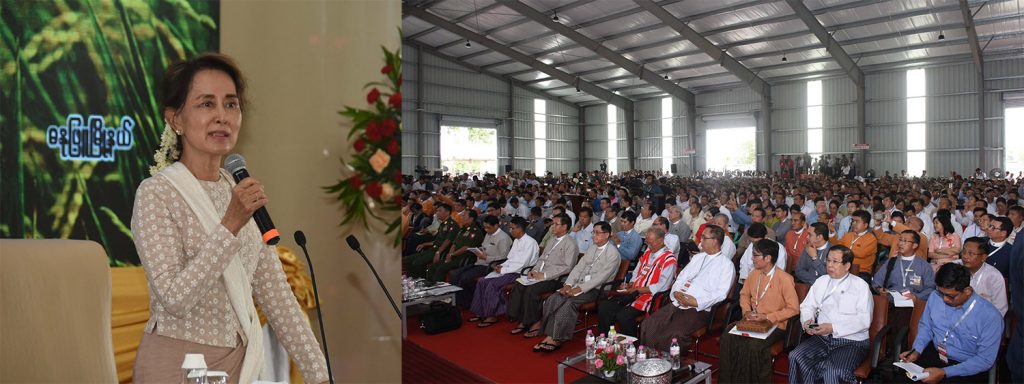State Counsellor Daw Aung San Suu Kyi met with local farmers in Danubyu, Ayeyawady Region, yesterday.
The State Counsellor and her entourage arrived in Danubyu by helicopter yesterday morning to meet with local farmers.
At the meeting, the State Counsellor said “It is learnt that close to 2,000 peasants and farmers have attended this meeting. It is also learnt that private businesses, associations and organizations, merchants and mill owners were in attendance. On the administrative side union level and state/region level officials were in attendance. For our country’s agriculture to develop, it was important for all in attendance today to cooperate with empathy and understanding. It was especially important for our peasants, farmers, merchants and mill owners to have firm and durable relations, with understanding and sympathy.
To have such relations government departments were to assist and help in a correct way the requirements of the farmers, agriculture businesses and companies. Among the departments, the land records department, irrigation department, agriculture department and agricultural mechanization department were directly dealing with the farmers and peasants and providing services on behalf of the Union government. As such these departments must warmly help and assist the farmers and peasants. They must be in close and regular contact. If there were anything in which the departments were unable to provide help or assistance, open and honest reasons and explanations must be given on why. As the government had financial and budget limitations, selection had to be made based on priority. I request the understanding and acceptance of our peasants and farmers on this matter.
Doing anything would require a lot of financial backing. As a developing country, we don’t have sufficient financial strength to do everything we want to do. So if things can’t be done now, our government will explain about it openly and the reason why. To provide such explanation is the responsibility of the government while to receive such explanations are also the rights of the farmers and peasants. Everyone had rights. Farmers and peasants also had rights. But there were also responsibilities. If both sides gave equal value to both the rights and responsibilities, any problems can be resolved.
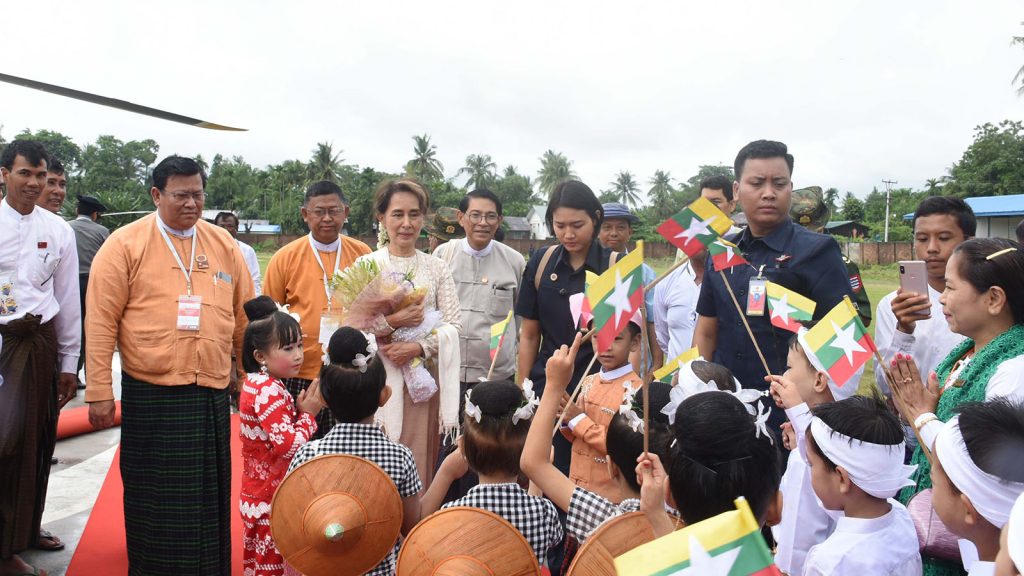
Land matters for the farmers
Priority has been given towards amending land use laws and rules that are of vital importance for the farmers to be clear, concise and practical. Especially farm land, vacant, fallow and virgin land laws were given a priority for the Hluttaw organizations and the government departments to work on. On the other hand, the Office of the President had been giving emphasis towards returning land confiscated for any reason back to the original owners.
When I went to all parts of our country and met directly with the people, farm land matter was the matter that was raised most. That was why I’m pushing for the quickest settlement of farm land problems. Even though time limitations were set up, on the ground there were instances of years of wait and delays with many outstanding cases remaining. Reviews and assessments must be made on whether responsible people were not taking responsibility or simply shuffling papers back and forth. Relevant ministerial departments and state/region governments were urged and pressured to look into it and do the necessary.
What we found was that in some cases, those who had confiscated the land were delaying matters because they don’t want to release back the land. In some cases, administrative sections were not conducting their works properly. Some original land owners also don’t have proper evidences to show their original ownership while there were cases of people acting as original land owners and attempting to get lands falsely. So it was important for all sides to be truthful, straightforward and responsible. Only then could the land matters be resolved quickly. In the Ayeyawady Region, the Region Chief Minister discussed earlier that people or organizations that were to release back the lands were delaying matters. Such people and organizations were urged not to delay. Why hold on to something that you don’t own? It is good for all if it is returned quickly. It is good for the country. To date, our country depends on agriculture and farm land matters are very important. Cooperate with the authorities to speed up matters as it is honorable to return things that you don’t own and it is also beneficial to the country as well.
At the same time we were studying matters that cause difficulties for our peasants and farmers. For example, due to recent changes in foreign market, there were great impacts on crops selected and grown in the country. Our government would provide policy support to change and grow crops that were profitable.
Peasants and farmers would also have to do their part. In the time where things change quickly, they must not be slow. It was not even year by year but month by month, climate wise and market wise that we all must study what is the most beneficial and profitable crop. The government would help and assist but the farmers and peasants themselves must have the will to study. Crops that grow well in the past may no longer grow well due to climate change. The planting method may have to be changed. Continuous study must be made and appropriate and timely changes made. It was expected that Ministry of Agriculture, Livestock and Irrigation would educate and distribute as much news and information as possible.
Farmers and fishermen were important for our country’s economy as well as for food sufficiency of our people. Due to this importance Protecting Rights and Enhancing Economic Welfare of Farmers Law was enacted.
To implement this law, the steering group led by Vice President U Henry Van Thio was formed with the secretary was Union Minister Dr. Aung Thu. State/Region Chief Ministers were members. We’ll strive for the benefit of the farmers and peasants based on the law.
If this group had shortfalls in implementing the matters prescribed in the law, our farmers and peasants had the right to demand, insist and criticize. We’ll do what we can to implement the aims and enactment of the law. Here I want to talk a bit about rule of law. Ever since we took up responsibility, we designated rule of law as the main requirement. Rule of law was very important for peace and stability in a country. Without peace and stability, the country wouldn’t develop. Law is not one sided. It is to protect all. No one is above the law. It is fair and equitable to all. If a law is not fair and equitable or not up to date, the legislative pillar of the Hluttaw must change what ought to be changed.
That was why rule of law must be respected. We must abide by enacted law. If a prevailing law is not just, unfair and inappropriate, the people can ask to change or amend the law through their Hluttaw representatives. Hluttaw is the legislative pillar. If law is required to be amended, it must be amended according to the law. If a law is fair and just to all, all must abide by it. It is not rule of law if people abide by it only in cases where you turn out to be the winner. I want to caution both sides on this. On land matters, people think the law was good if they turned out to be the winner. If they lose, they complain that the law was not good. This is not how it is done. Law must be fair. If you think it is not fair, attempts must be made within the law to amend it.
Process of setting base price for rice and paddy
In a meeting held in Nay Pyi Taw on March 2018, I urged to announce a base price of full quality rice at Ks 500,000 per 100 tins. As insisted, an announcement was made accordingly. But the base prices must be announced every season. International practice was to study the local and foreign market and make an announcement before the planting season. Depending upon this announced base price, peasants and farmers grew crops that wereprofitable and beneficial for them.
In our country too, even if base price couldn’t be announced for all crops, it should be announced for main crops like peanut, sesame, corn etc. that were widely grown by the farmers. Weaknesses and strengths of the announcement of the base price made last year must be studied and reviewed. The work of announcing a base price must be conducted under long term cooperation between the government, private businesses and farmers. The government on its side must strive towards ensuring that the price did not fall below the base price.
A base price is the very basic price and the price must not fall below it. Government and theprivate sector must cooperate towards increasing demand if production of a crop rises. People sometime don’t know that we were discussing such matters with other countries. The farmers don’t know.
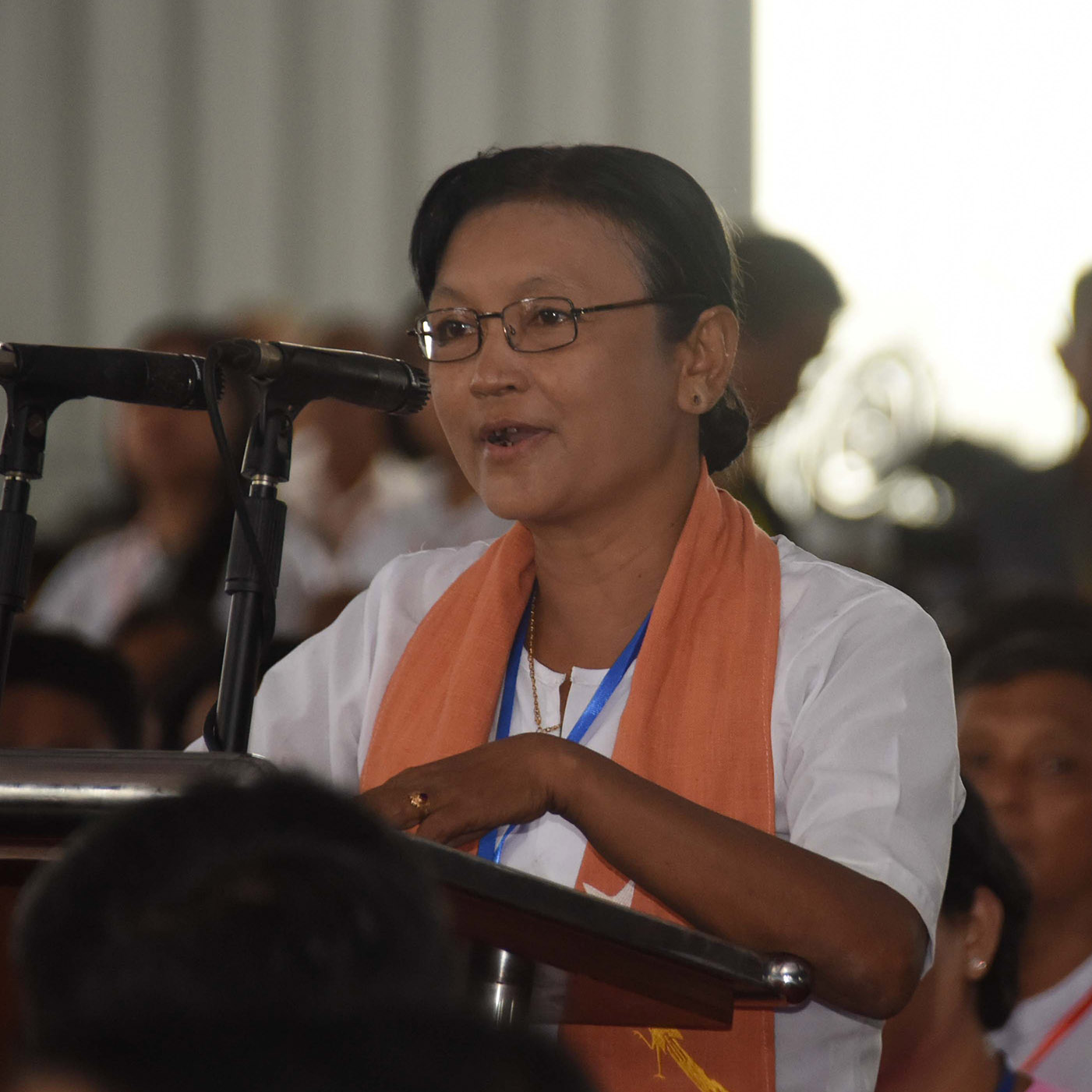
The pulses and beans prices drop because India was not buying as much as they bought before. So we have to discuss and negotiate with India. We discuss as friends to resolve it. It is the same with other countries too. There are many matters in which we discuss as friends with other countries so that it was beneficial to both.
If for any reason prices fell below base price public-private arrangement to purchase and store surpluses had to be made systematically. These processes are not for a single season or a year only. It goes on season by season and year by year continuously in cooperation. The next government will also have to do the same for the benefit of the peasants and farmers, and for rural people. The matter of setting base price is a long term work process based on basic matters like market and production amount.
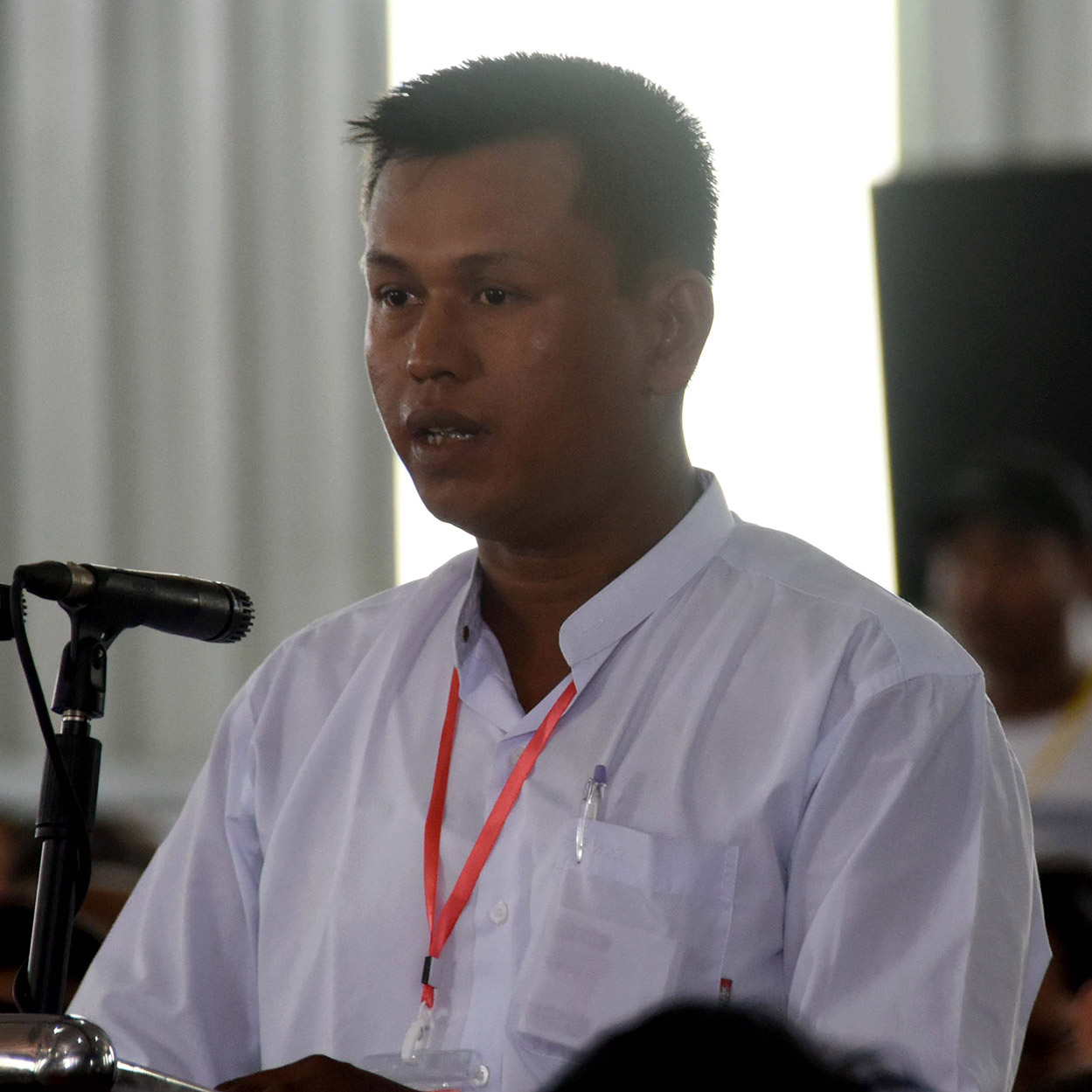
Agriculture loan
While doing a short term work on one hand, our government is also dong some priority works that had long term benefits. In the long run we’ll work towards making theMyanma Agriculture Development Bank a real development bank that the farmers can rely on. Support and assistance of international development partners were being obtained towards achieving this transformation. We know the importance of Myanma Agriculture Development Bank for our farmers. We were striving towards providing expanded short, mid and long term loan services of the bank.
When our government took over the responsibility in 2016, agriculture loan for monsoon paddy was increased from Ks 100,000 per acre to Ks 150,000. For other crops, it was increased from Ks 50,000 to Ks 100,000. However, this amount is actually not enough for our farmers and peasants. Based on the financial situation of the Union government, we’ll increase agriculture loan step by step.
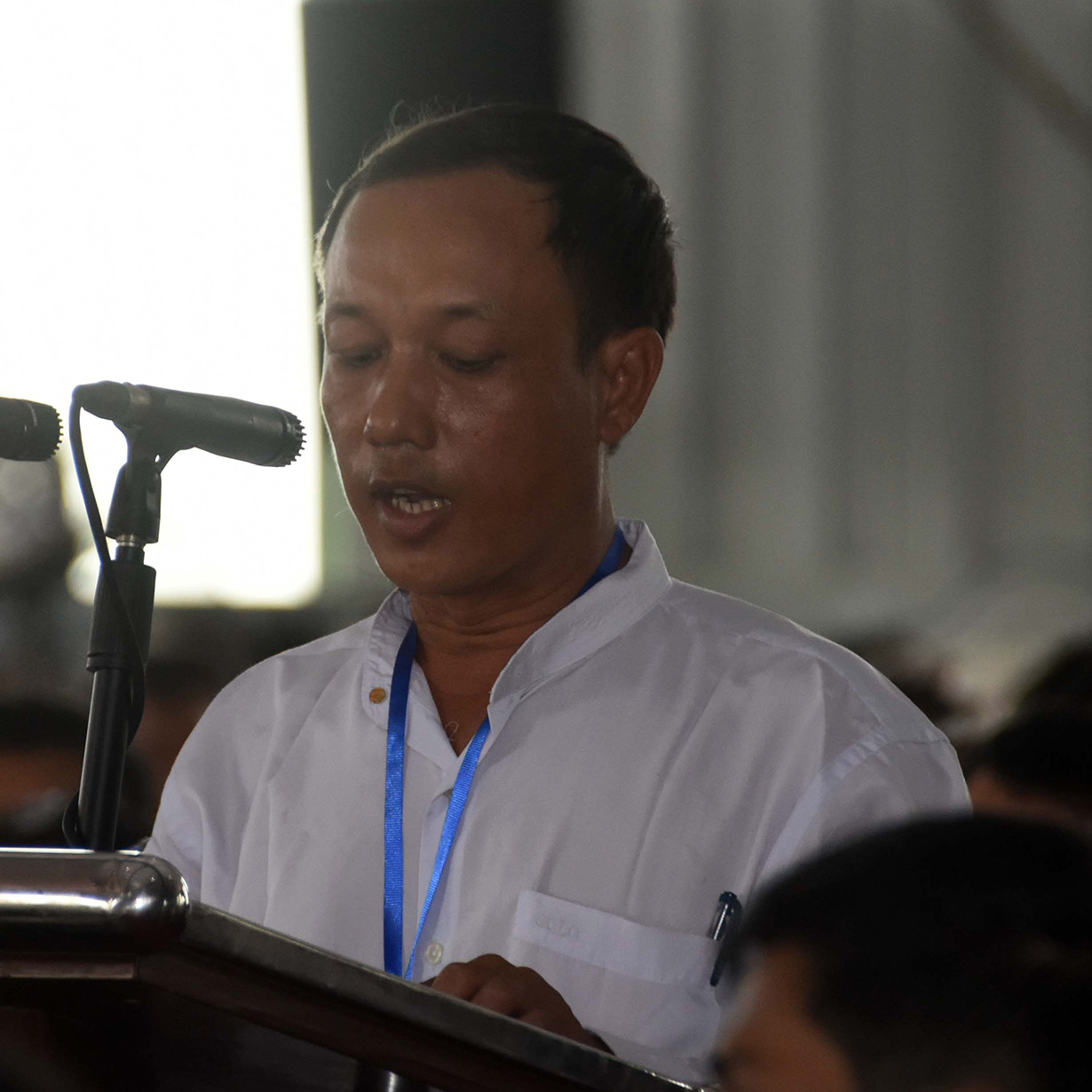
Here I would like to make a special request to private banks. They are urged to provide short and long term loans as much as possible for the agriculture sector according to rules and regulations. Give this a priority. If private banks can provide agriculture loans in accordance with to banking regulations, they’ll be doing the same works as the state-owned Myanma Agriculture Development Bank. We encourage competition. A competition needs to be fair, good and beneficial to our people. State-owned banks must be able to compete with private banks and international banks. If we had such fair competitions, it’ll benefit all our people including the farmers.
Our farmers also must not compete within the country. They must compete with the world. Now is the time when we could not stay however we like in our country. We must always look at the situation of other countries. In an age when we are competing with the world, we must put in our effort and develop. Development had its own timing. We missed out when Southeast Asia developed so we must strive towards catching up. World organizations had predicted our country to have the fastest development rate. Even though this is an encouragement, it must be noted that we need to do it. We could not relax because we were predicted to have the fastest development rate. Then our rate will drop. It is through all out efforts by all that this development rate could be maintained. It is with this in mind that I’m telling the farmers, the banks and the businesses.
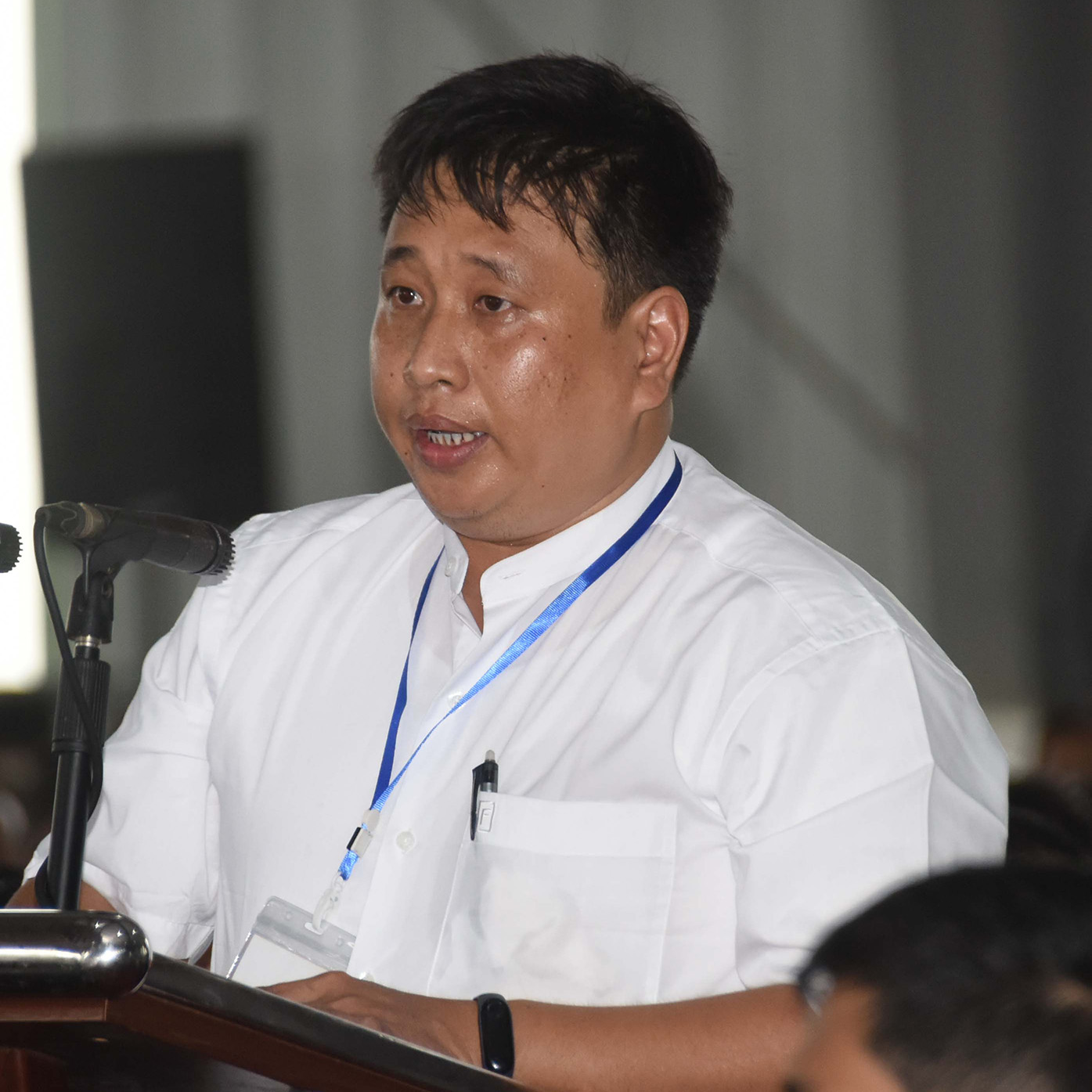
Invite more foreign investment
Our government recently laid down policies for international businesses to trade in our agricultural sector. The market was expanded for value adding agriculture products. Here too local business should not worry. If we look at others as partners rather than rivals, we’ll gain international experiences, we can obtain and learn research and development works from international businesses. For agriculture sector development systematic international cooperation is required and foreign investment in agriculture sector must be invited.
Food safety
While meeting with our peasants and farmers a special request I’d like to make is food safety. Our country is based on agriculture and our agriculture products had good names. As life styles develop and change people are demanding safe food. Our farmers and peasants are to use pesticides and chemical only when it is absolutely necessary.
We are competing with the world. We must be up to the standard set by the world. Developed countries are careful about their health. They take great care towards ensuring the safety of the food they consume. If our agriculture products were not up to the standard set by the world, it’ll be difficult for us to enter the world market. Think long term and don’t look at short term gains.
Using pesticides will kill pest quickly but the outcome is getting less price for the product. Sometimes, it might become unsaleable. So look long term and put in effort towards producing world standard food.
Excessive use of chemical s will have bad consequences on our agriculture products both in local and international markets. Trust and reliability is important in business. Once trust is lost, it would be hard to restore it. Our farmers and peasants must be responsible producers for our consumers.
To become an effective ministry for farmers and peasants
Our peasants and farmers in rural areas are doing both agriculture and livestock breeding. It was done as a tradition. In the past there were agriculture and livestock breeding was two ministries. Now it was combined. The aim was for a single ministry to provide agriculture and livestock breeding requirement of rural farmers and peasants. In addition to this cooperative sector was also included so a cooperative system that is appropriate for the 21st century and the one that could be conducted by the rural farmers and peasants can be systematically conducted.
Africa Swine Flu is something to be aware of in livestock breeding. The damage to some ASEAN countries was high and wide. As our peasants and farmers were also raising pigs, special care must be taken towards having preventive/protective measures in place. Ministerial departments and state/region governments must make preparations to provide systematic information and education works. Advance warnings, cautionary notes, matters to be aware of etc. must be shared and distributed to prevent cross country contamination.
Development of basic farm resources
Agriculture development projects, rural road links, storage and drying facilities, pure breeds and markets are things or works that must be strived for continuously. Basic farm resources required by our farmers and peasants such as trade routes, technology, resource development etc. were to be fulfilled by the government. Market conditions, world politics, economy etc. are changing daily and we must not lose sight of it and study it continuously. Farmers, peasants and the government are requested to cooperate in this.
We place great emphasis on matters raised here. As Union Ministers, Deputy Ministers and officials from Region government who are directly responsible for agriculture sector are also present they’ll also discuss and respond to questions.
Thank you.”
Following her speech, Daw Than Than of Zalun Township reported to the State Counsellor on their challenges including shortage of labour, shortage of pesticide sprayers to control pests, requirement of contract farming system at every township which can guarantee stable crop price at the time of harvest, access to fertilizers at a reasonable price, dredging Innkaw canal which benefits over 5000 acres of farmland and building a bridge across a river.
Similarly, U Hla Naing Soe of Sisongon Village suggested the Union Government to send the companies or organizations which can guarantee the quality rice market at the villages, to announce the price of crops before planting season, to help farmers who do not get access to the government’s agricultural loans to get loans from private banks, to grant sufficient agricultural loans and turn the emerald green village project to a project like a new village project.
U Toe Toe Win of Hleswe Village urged the Union Government to supply quality seeds, technology and capital to farmers timely and to timely announce the type of land which is suitable for the quality seeds, to upgrade the farmland to meet the modern farming system, to build all-weather production roads, to help the farmers facing high price for fertilizer and pesticides through the government and private banks and to sell modern sprayers to the farmers in installments or lend them to farmers.
U Hla Shwe of Ywathit Taung Village asked the Union Government to provide loans to farmers with lowest interest rate to build silos and modern dryers, to create more foreign market, to lend short-term loans to farmers and to help SMEs.
The suggestions of the farmers were replied by Union Minister Dr Aung Thu, Ayeyawady Region Chief Minister U Hla Moe Aung, deputy ministers U Aung Htoo and U Maung Maung Win and officials.
Afterwards, another three farmers suggested the Union Government to allow farmers to pawn about 30 percent of the value of the farmland and the problem of drought hitting the Bodi Creek in summer.
Union Minister Dr Aung Thu, Ayeyawady Region Chief Minister U Hla Moe Aung, Deputy Minister U Maung Maung Win replied to the questions of the farmers.
Afterwards, the State Counsellor made concluding remarks. She said “Rounding all up, the main requirement is for, farmers and government to have more interactions. Peasants, businesses and government participate in this meeting. Such a meeting does not end with one meeting. It must be done all the time. The responsibility here lies in the Region Government because the Union Government could not come all the time. It had to do things all over the country. We could not do this in Ayeyawady Region only. We’ll have to do this in 13 other States and Regions. For Ayeyawady Region that is dependent on agriculture and livestock breeding, Region Government members, administrative officials must always engage with farmers and peasants. Among some of the questions answered by Dr. Aung Thu and U Maung Maung Win some included ignorance or not knowing the rules, regulations and laws. The government is responsible to make the people know these rules, regulations and laws. It is better for the Region Government to do this rather than the Union Government.
Another matter is the Union Government not knowing the requirements of the farmers and peasants. In such cases, it is the responsibility of the Region/State government to let the Union government know the requirements. In other words, Region/State government is a bridge between the Union government and the people.
My suggestion would be for members of the state/region governments and administrative personnel are to engage regularly with farmers and peasants. Go on field trips. Go to where the farmers and peasants are. Or meet with all at a place. People from many places came to Danubyu so they were unable to tell details about what was happing in their places or what was required. With such limitations we will also be unable to fulfill fully. It is important to have engagements all the time. Another matter is for peasants and farmers to obtain notifications, announcements, news and information issued by the Ministry of Agriculture, Livestock and Irrigation. This can be done if you had a mobile phone. I’d like to urge all to put in efforts here. If you do this, your views and knowledge will become wide. You’ll also find solutions to matters that you saw as problems.
In conclusion, thanks to all for coming to the meeting. I said our country was an agriculture based country. Some look down on a country based on agriculture. Some think only industrialized country develop, progress and are at the front. No. It is not like that. Some of the world’s most developed countries are agriculture based country with developed industries. They are based on agriculture and they value add their products step and step and become developed. I frequently think whether our country will become such a country. The world today requires food sufficiency. Everyone is concerned about this. Agriculture sectors decline in developed countries. They rely on other countries to import food. In other words, they’ll have to turn toward agriculture based countries that produces food.
Looking at the world’s situation, our country’s development, fulfilling the requirement of the world, for our benefit and for the benefit of all, it is strongly believed agriculture is not beneficial only for our farmers and peasants but also for our country too.
So our farmers and peasants must believe in oneself and work. Inform relevant departments if there are any problems. Without saying anything a solution can’t be found. Say when it is required to be said. State/Region government and administrative department must conduct field visits. Always engage with farmers and peasants. Hold meetings frequently. Only then can one side hear the other side. Only then can problems be resolved together.”
After the meeting, State Counsellor Daw Aung San Suu Kyi enjoyed lunch together with the farmers and greeted them.
About 1963 farmers, 400 ricer millers, traders and guests, over 100 departmental officials totaling 2475 attended the meeting.
The State Counsellor flew back to Nay Pyi Taw by helicopter in the afternoon and arrived back Nay Pyi Taw in the evening. The following senior officials were also present at the meeting: Union ministers Lt-Gen Kyaw Swe, Lt-Gen Ye Aung, U Min Thu and Dr. Aung Thu, Ayeyawady Region Chief Minister U Hla Moe Aung, Deputy ministers U Aung Htoo, U Maung Maung Win, members of the Ayeyawady Region Government, Hluttaw representatives, departmental heads, entrepreneurs and local farmers. — MNA
(Translated by GNLM)
